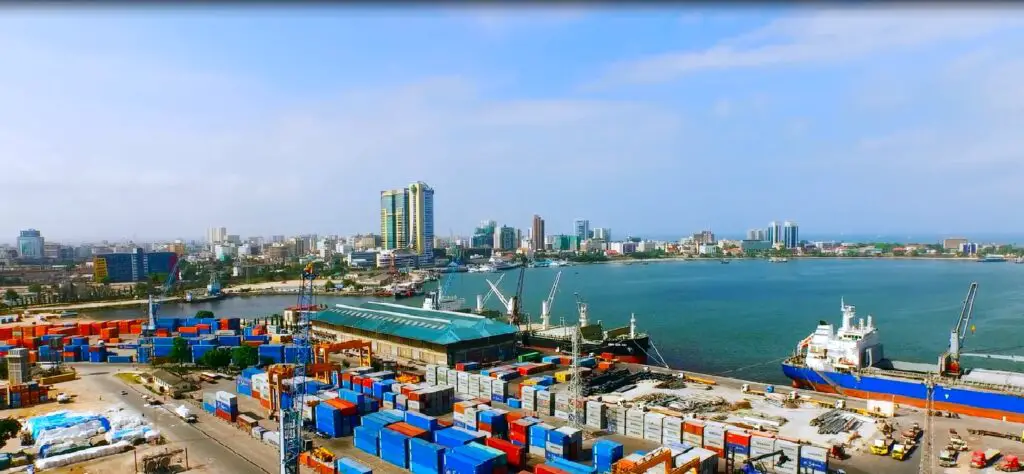- Traders across East Africa are shunning the Port of Mombasa in favour of Dar es Salaam Port citing higher fees.
- Uganda complains that up to 50% of their traders’ costs go to port clearance and transport expenses from Mombasa.
- The entry of DP World into the Dar es Salaam port promises improved vessel discharge times, lower fees, and increased profits, a move that will significantly challenge Mombasa.
In the shadow of rising cranes and towering cargo ships, the Port of Mombasa faces a formidable rival in the form of the Dar es Salaam port in Tanzania. Both harbours have set their sights on becoming the primary entry point to the promising opportunities in East African Community, a market of approximately 500 million people. The competition is fierce, and the stakes are high.
Mombasa port vs Dar es Salaam: The battle for East Africa’s gateway
As of 2022, cargo handling at the Port of Mombasa decreased by 1.9 per cent. The drop is attributed to competition from Tanzania’s Port of Dar es Salaam and various additional fees. By comparison, the Tanzania Shipping Agencies Corporation, which operates the Port of Dar es Salaam, has abolished these fees, making its port more appealing to traders.
To counter the sting, Kenya is taking measures to attract traders to use its port. These measures include reducing port fees and extending storage duration for transit cargo. The Port of Mombasa is also eliminating destination charges. The Kenya Ports Authority (KPA) has removed the previous requirement of depositing $3,000 per container upon landing at the port. Kenya has also lowered other fees by up to $1,200, according to Salim Mvurya, the Kenya’s Cabinet Secretary for Mining, Blue Economy, and Maritime.
This move not only poses competition for Tanzania’s Port of Dar es Salaam but also challenges Kenya’s private clearing agencies. Kenya through its Government Clearing Agency (GCA) is attracting cargo to be handled by the unit. This effectively increases its share from 51 per cent to 52 per cent of the 33.9 million metric tonnes of cargo passing through the port annually.
Also Read: DP World’s tightening grip on Africa’s blue economy
Private sector faults operations at Port of Mombasa
This move is however facing backlash from the private sector, represented by the Kenya International Freight and Warehousing Association (Kifwa). Kifwa argues that the government is contradicting its proclaimed support for private sector growth and is now directly competing.
Despite private sector challenges, authorities are lobbying with landlocked EAC countries to secure their commitment to use the Port of Mombasa. Recently, the Managing Director of KPA, William Ruto, met with Uganda’s Foreign Affairs Ministry Permanent Secretary, Vincent Bagiire.
The Ugandan delegation called for the removal
of all regional trade barriers to maintain Uganda as a key trade partner for Kenya. They noted that up to 50 per cent of their traders’ costs go to port clearance and transport expenses. Further fee reductions by Kenya would result in cheaper import fees for Ugandan traders and lower prices for goods upon arrival in Uganda.
Uganda remains Kenya’s largest trade partner for transit goods, accounting for 83.2 per cent of transit cargo at the Port of Mombasa. In comparison, South Sudan accounts for 9.9 per cent of transit cargo, followed by DRC (7.2 per cent) Tanzania at (3.2 percent), and Rwanda at 2.4 per cent.
Uganda is requesting Kenya to remove Non-Tariff Barriers, such as weighbridge stops and roadblocks hindering transit business.
Movement of goods on Northern Corridor
The EAC partners have agreed on coordinated infrastructure development to facilitate the movement of goods in the Northern Corridor. The agreement includes expediting the construction of a Standard Gauge Railway (SGR) network, cooperating in air services, and implementing a single East Africa Tourism Visa.
EAC trader partners are anticipating the NCIPs 15th Summit, which had been delayed due to economic and political challenges. Collaboration with the NCTTCA is being emphasized to implement the NCIPs effectively.
To further attract neighboring countries, Kenya is reviewing cargo storage time. Since October 24, 2023, traders have up to 45 days’ extension of cargo storage at the port free of charge. This represents almost double the previously allowed layover time for cargo.
However, this 45-day extension currently applies to cargo destined for regions beyond South Sudan and DRC. Nearby countries like Burundi and Rwanda will have 35 days of free storage, up from the previous 30 days. Uganda’s storage period has been extended by two days, allowing traders 30 days of free storage.
Read also: Crude falling prices favour African importers
Port of Dar es Salaam has dropped fees
As the silent battle for maritime supremacy unfolds, Tanzania’s Port of Dar es Salaam has eliminated various fees. And this is making Dar es Salaam port more attractive to traders. Tanzania’s competition strategy also includes privatizing a significant part of the Dar es Salaam port. Most recently, Dubai’s DP World has secured rights to manage at least three berths at the port. This deal with DP World promises improved performance, reduced fees, and increased profits. DP World pojects to reduce vessel discharge time to one day from the current four to five days.
Further, Tanzania aims to have DP World manage and oversee logistics for nationwide transformation across the entire logistics value chain. The Tanzania Freight Forwarders Association president, Edward Urio, believes Dubai’s DP World will add value to Dar port. Since DP World has a strong global reputation, it is expected to attract more traders to use the port.
The Dar Port can handle 14.1 million tonnes of dry cargo and six million tonnes of bulk liquid cargo. As the African sun rises over the Indian Ocean, casting a golden glow on Mombasa, Kenya faces the challenge of regaining dominance while addressing private sector concerns.
